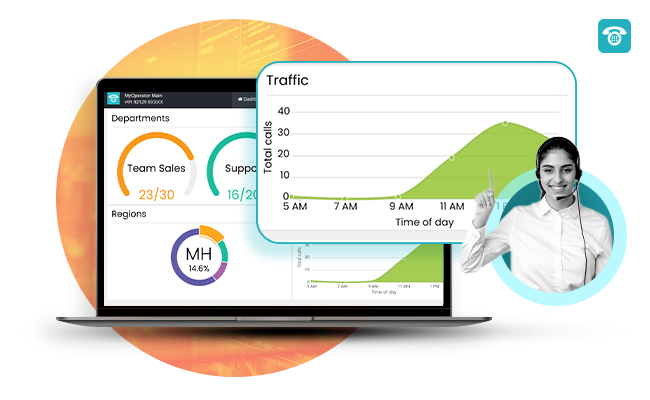As the popular saying goes, data is the new oil for business! And this saying goes true for harnessing the power of data to level up your sales and support functions and set your business to grow faster. In this article, we’ll talk about how data automation can help you enhance your sales and support operations for a delightful customer experience.
We will review the importance of knowing your business metrics and the best ways to use code and automation to build solutions.
What is data automation?
There is no doubt that data automation can play a significant role in enhancing sales and support operations. Businesses can save time and resources while improving overall efficiency and security by automating everyday tasks and making use of smart automation tools, such as:
- Capturing sales data and tracking customer service interactions with MyOperator cloud call center communication platform
- Automating manual sales and support tasks using a service like Zapier to connect different apps.
- Managing product catalogs and sales enablement content using sales enablement tools like Seismic.
- always securing sensitive information while sending to outside the organization using tools like Redactable.
Another benefit of data automation is the ability to mine insights from large volumes of data. This information can be used to improve customer service, identify trends, and make better decisions about product offerings.
There are a number of ways to implement data automation in your business. One approach is to use dedicated software tools. These tools provide an integrated environment for collecting data, analyzing it, and making informed decisions. In addition, this approach also allows you to access the necessary data from anywhere in the world with minimal installation requirements.
Benefits of using data automation for improving sales and support
While using data automation for improving sales and support operations, your business can get following benefits out of it:
Increased efficiency and effectiveness: Automating business processes can increase efficiency and effectiveness, as well as the ability to manage more complex tasks.
Reduced time spent on routine tasks: Data automation can allow employees to focus on more critical tasks.
Improved customer service: Businesses can improve customers’ overall experience when contacting them by automating customer service processes. This can lead to increased sales and loyalty among customers.
Reduced risk of human error: By automating specific business processes, businesses reduce the risk of human error and potential consequences from such mistakes such as missed deadlines and follow-ups.
Greater transparency into business operations: Automated business processes can provide greater transparency into a company’s operations, allowing for improved decision-making and oversight.
Why should you use data automation for sales and support?
When you use this to improve sales and support, you can improve your efficiency, accuracy, and communication. Data automation can also help you track customer interactions and analyze customer behavior. Data automation can also help you create predictive models that identify potential problems or solutions before they happen. When you use data automation in these ways, you can make more effective decisions and provide better service to your customers.
Additionally, data automation can help you automatically generate reports that provide detailed information about your sales activity. These reports can help you identify trends and patterns in your sales data, allowing you to make better decisions about where to focus your efforts. For example, call reports in MyOperator a leading call center software provide smart insights to continuously improve sales and support based on call data.
Data automation can also help you automate the process of gathering support data. This information can be used to track how well your support team is performing and identify improvement opportunities. Automating this process can save time and effort for your team members. Additionally, data automation can help you automatically generate reports that provide detailed information about your support activity. These reports can help you identify trends and patterns in your support data, allowing you to make better decisions about where to focus your efforts.
How do you use data automation for sales and support?
Sales and support teams use data automation in various ways to improve their workflows. Automated data analytics and API-based data collection can help sales reps track leads and prospects, automate quoting and proposal creation, and identify sales opportunities. Data analysis can help support teams understand customer needs and churn rates, identify trends, and make better decisions.
Sales reps can use data automation to generate leads from social media, email marketing, or lead-gen websites. Automated lead capture and smart lead nurturing tools allow reps to track contact information for each lead, gather basic information about the prospect, such as company size, industry, and clients, and assign a priority score. Sales reps can also use lead-scoring algorithms to prioritize leads based on their potential value to the company.
Support teams can use data automation to streamline customer interactions by automating tasks such as receiving customer requests, responding to tickets automatically based on rule sets defined by managers or analysts, conducting automated surveys or interviews with them after customer support calls have been resolved, or even sending automatic notifications when new updates are available for software products being supported by the team. Support teams can also use data analytics to understand customer needs better and provide faster resolutions for issues that require more attention.
Conclusion
Data automation can play a significant role in enhancing the sales and support processes for your business. By automating data collection, tracking, and analytics, you can free up your team to focus on more important matters like sales and support while ensuring that your data is always accurate, up-to-date, and fueling your business growth.





